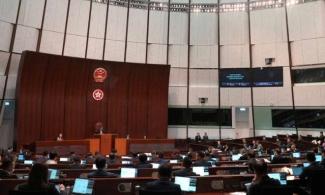
The Safeguarding National Security Law passed on Tuesday includes new measures on treason, espionage, external interference, state secrets and sedition, Al Jazeera reports.
Hong Kong’s Legislative Council has unanimously passed a new national security law that expands the government’s power to crush dissent.
“Today is a historic moment for Hong Kong,” said Chief Executive John Lee, who added that the law punishing five major crimes would go into effect on March 23.
It grants the government more power to quash dissent, widely seen as the latest step in a sweeping political crackdown triggered by pro-democracy protests in 2019.
It comes on top of similar legislation – the National Security Law – imposed by China in 2020, which has already largely silenced opposition voices in the financial hub. But both the Chinese and Hong Kong governments say the Beijing-imposed law restored stability after the 2019 protests.
Critics say that the major piece of legislation, known as Article 23, passed on Tuesday further threatens the China-ruled city’s freedoms.
“It makes the National Security regime much more comprehensive,” John Burns, an honorary professor at the University of Hong Kong, told Al Jazeera. “It includes a whole raft of things that were not crimes before or that were colonial crimes, but they have updated the crimes, they have increased the penalty.”
The 90-seat council stacked with pro-China loyalists was first presented with the bill on March 8, following a monthlong public consultation, with Hong Kong’s leader calling for it to be enacted at “full speed”.
Eighty-eight politicians and the council’s president voted unanimously to enact the legislation.
The law threatens stringent penalties for a wide range of actions authorities call threats to national security, with the most severe – including treason and insurrection – punishable by life imprisonment.
Those found guilty of treason could face sentences of up to life imprisonment, while those convicted of breaching state secrets or espionage could face 10 and 20 years respectively.
Punishments relating to alleged collusion with foreign forces will also be increased, particularly if people are deemed to be working together rather than alone.
Penalties have been increased for sedition, currently addressed under a colonial-era law, to between seven and 10 years from two. In contrast with the internationally accepted standard for sedition, the new law says that people can be charged with the offence even without an element of violent intent.
Other provisions include allowing police to detain suspects for two weeks before charging them, compared with 48 hours currently, and giving police the ability to apply for permission to remove a defendant’s right to a lawyer while in pre-charge detention. The bill also allows the authorities to cancel the passports of “absconders”.
Legislative Council President Andrew Leung said he believed all lawmakers were honoured to have taken part in this “historic mission”.
In 2003, an attempt to pass a version of the law led to a street protest that drew half a million people, leading to the withdrawal of the legislation.
Some human rights organisations and foreign governments have criticised the vagueness of Article 23 and said it may be used to silence critics.
Critics also worry that the new law will further erode civil liberties that China promised to preserve for 50 years when the former British colony returned to Chinese rule in 1997.